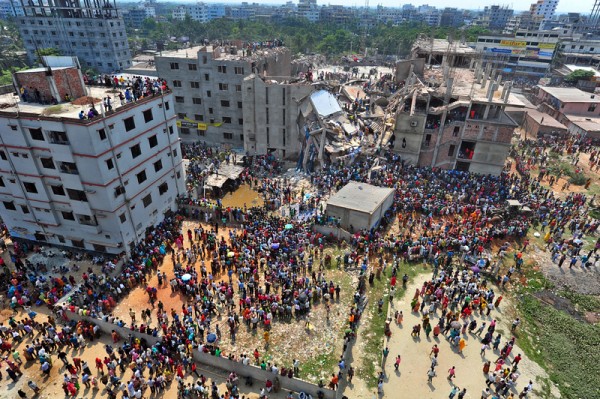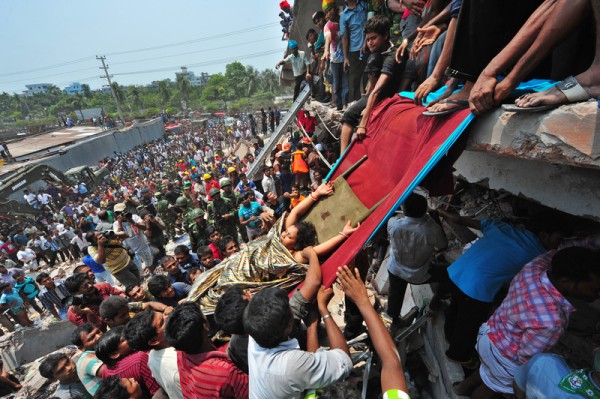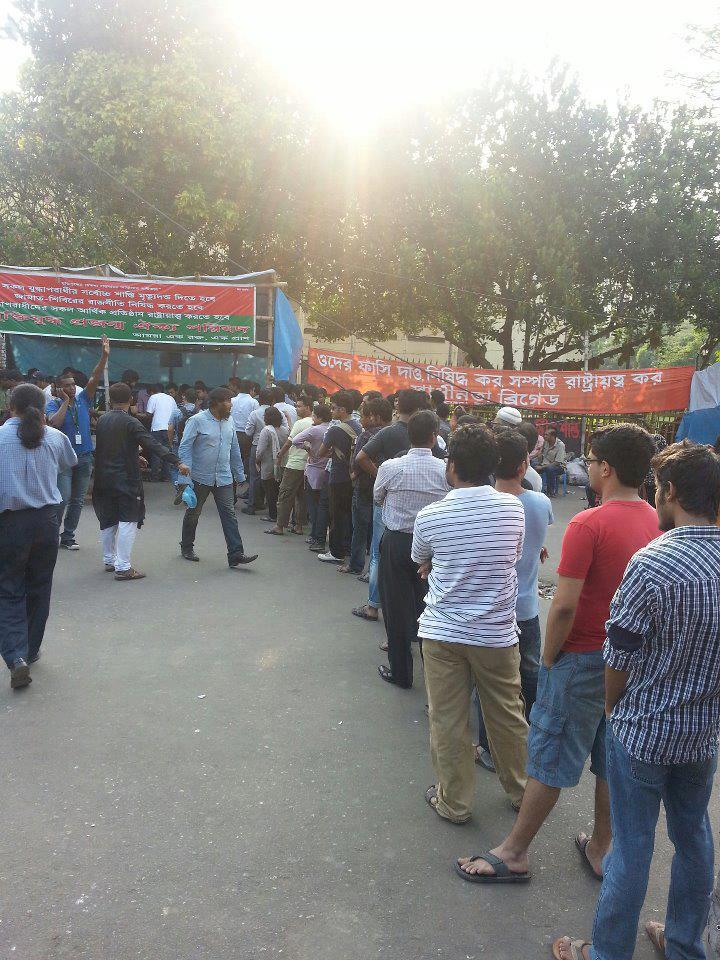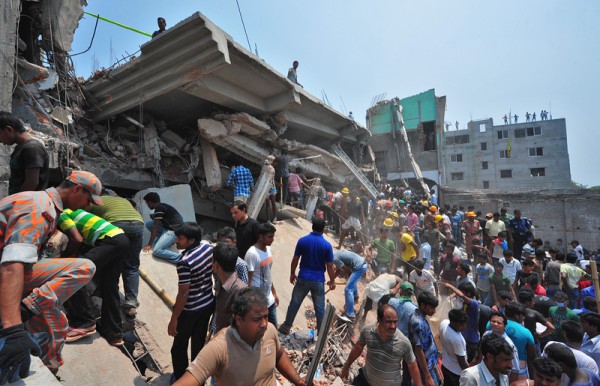A nine-story building with mostly garment manufacturers collapsed in Savar, in the outskirts of capital city Dhaka, killing 142 people and injuring close to a thousand, resurrecting concerns of safety conditions in Bangladesh's manufacturing industry.
More than a thousand are believed to still be trapped under the rubble.
Six garment manufacturers were operating from the third to the eight floor of the structure in Savar and at least five thousand people were inside the crowded building when it caved in on the morning of April 24, 2013.
This disaster comes five months after a fire killed more than a 100 people, mostly women, at another overcrowded garment factory Tazreen Fashions.
Since that incident, there has been increasing concern about workers safety and inadequate emergency response systems in the industry. Garment factory workers have also been agitating against poor-pay.
Bangladesh is the second largest producer of ready-made garments after China. International retailers Walmart, H&M, Sears, GAP, Tommy Hilfiger and many other renowned brands outsource their cloths from Bangladesh, bearing the tag “Made in Bangladesh”, a pride for the country. Blogger and journalist Arafatul Islam thinks such pride is at stake:
পোশাক কারখানায় আগুন লেগে পুড়ে মরে শ্রমিক, পোশাক কারখানার ভবন ধসে চাপা পড়ে মরে শ্রমিক… লাশের মিছিল এভাবেই বেড়ে চলে। আগে ‘মেইড ইন বাংলাদেশ’ দেখলে আগ্রহ ভরে কিনতাম। এখন কেমন যেন সেই লেখার মধ্যে রক্তের দাগ দেখতে পাই, মৃত্যুর আর্তনাদ শুনি।
Workers die in factory fires, workers die in factory building collapses.. the procession of the dead becomes long. I used to buy “Made in Bangladesh” cloths with pride. Now I see blood on that label, hear the cries of death.

The scene after a nine-storey building collapsed in Savar, on the outskirts of Dhaka. Image by Firoz Ahmed. Copyright Demotix (24/4/2013)
Netizens expressed their outrage on social media about the repeated disasters at garments factories. Most workers in this sector are women. Blogger Vashkar Abedin writes in Facebook:
আহা বোন!
সুঁচ-সুতো দিয়ে কেবল নিজেদের মৃত্যু বুনে যাচ্ছো…
Ah sister!
Sewing your death only…
Joydeep Dey Shaplu cannot control his rage in Facebook:
এতো লাশের ভিড়ে কেউ জীবিত থাকতে পারে না। আমি আপনি সব শালা লাশ… নইলে এতো লাশ পড়তো না এ দেশে…
Nobody can be alive among all these dead bodies. We are zombies.. otherwise we could not let so many deaths happen..
There was a crack in the building evident just the day before. The factories were closed immediately [bn]. But the signs of impending collapse were ignored by the building owner as he opened it for business on 24 April and workers were forced to go back to work. Sumeema Yasmin Sumi cannot accept such a reckless decision from the management:
এতোগুলো মানুষকে মৃত্যুর দিকে ঠেলে দেয়া হলো! এরকম দায়িত্বহীনতা কোনোভাবেই মেনে নিতে পারছি না।
So many people were forced towards death. I cannot accept such a lack of responsibility from the management.
Lucky Akter, one of the leading activists of the #Shahbag protests writes in Somehwhereinblog in a post titled “Mourn Not, But Protest”:
দাসপ্রথা নাকি বিলোপ হয়েছে বহু আগে কিন্তু আমরা তো দেখি দাস প্রথা নতুন ভাবে ফিরে এসেছে খুব ভয়ালভাবে, তা না হলে মৃত্যু নিশ্চিত-জেনেও শ্রমিকদেরকে পিটিয়ে পিটিয়ে কেন মৃত্যুকূপে পাঠানো হল? কেন মিথ্যা বেতনের আশ্বাস দিয়ে শ্রমিকদেরকে কারখানায় আনা হল?
Slavery has been abolished long ago. But we see that slavery has returned in a new form. Otherwise knowing that there is a death-risk, how come these laborers were forced to enter the death-zone? Were they lured back to work by promising bonuses?

Army personnel and civilian volunteers work together to rescue those trapped. Image by Firoz Ahmed. Copyright Demotix (24/4/2013)
The majority of Bangladesh's export earnings come from the ready-made textile industry. Tamanna Sultana writes on Facebook:
আমি লজ্জিত! একটা দেশের অর্থনীতির মূল চালিকাশক্তি যারা, তারা শয়ে শয়ে মরে গেলেও তেমন কিছু যায় আসে না। এই ঘটনা বার বার ঘটতে থাকে। বড় বড় ব্যক্তিগুলো সুখে শান্তিতে বসবাস করতে পারলেই হলো…
I am ashamed! Those who are the backbones of the economy of the country are dying in hundreds, and nobody cares. And this is being repeated again and again. It seems we care about the well beings of rich and powerful only.
The factory owners or those responsible are rarely convicted for their lapses that lead to the big disasters. Apurbo Shohag expresses rage in Facebook:
এই দেশে মৃত্যু কোনো ব্যাপার না। এই দেশে সবচে’ সস্তা জিনিস হলো মানুষের প্রাণ! শুধু আজকে সাভারেই নয়, এর আগেও যখন গার্মেন্টস কারখানাগুলোতে অসংখ্য প্রাণ শেষ হয়েছে বা ভবন ধসে মানুষ মরেছে আমরা তখন শুধুই শুনে গেছি মালিকদের শাস্তি হবে। শাস্তি হয় কি না সেটা আর জানা হয় না। তবে একের পর এক সাভারের মতো ঘটনা ঘটছেই। দীর্ঘ থেকে দীর্ঘ হয় লাশের লাইন।
In this country death comes easy. Because the cheapest thing is the human life. Not only today's disaster in Savar, we have heard many times after the previous factory disasters that those who responsible including the owners will be brought to justice. But we don't see them get punished. So such disaster happen again and again. The bodies pile up in greater numbers.
The Government has declared a day of mourning [bn] for such a tragic loss. There were appeals via Facebook to donate blood, and many rushed to donate blood in Savar and elsewhere.

Blood donation drive in Shahbag Square for the injured people of Savar building collapse. Image courtesy Shahbag Movement Facebook page.
Updates were being sent in Twitter:
@ShahbagInfo: Rh NEGATIVE BLOOD NEEDED in #Shahbag; 700 bags of #blood collected here, 500 sent to Dhaka Medical College & Enam Medical College. #Savar
Volunteers for Bangladesh crowdsourced volunteers via Facebook to help the rescue operations. More pictures of the disaster are available in this post by Blogger Bishkhoy.








9 comments